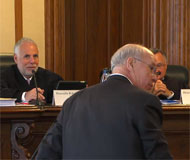5/22/2014
Illinois Supreme Court Takes On Red Light CamerasIllinois Supreme Court hears oral arguments on the constitutionality of the red light camera program in Chicago.

The Supreme Court of Illinois on Wednesday heard oral arguments in a case that will decide whether Chicago's red light camera program has been illegally operating for more than a decade. Redflex Traffic Systems of Australia began issuing tickets in the Windy City three years before the state legislature granted select jurisdictions permission to use automated ticketing machines. This makes the city's photo ticketing ordinance illegal, say Michael Reagan and Patrick J. Keating, lawyers who filed a class-action lawsuit to shut the program down.
"This case draws upon the power and the duty of this court to declare governmental action to have been improper when it has found to have been taken without the power to act and to declare law void when it is found unconstitutional," Reagan told the justices. "Chicago did not have municipal authority to enact its red light camera ordinance in 2003."
Like many jurisdictions that jump head first into automated ticketing, Chicago was not interested more than a decade ago in waiting for the state legislature to enact an authorization statute for the lucrative program that now issues 700,000 tickets per year. Reagan argued that Chicago's implementation of automated ticketing violated a statute requiring uniformity of traffic laws across the state. The Illinois General Assembly did approve of the use of red light cameras in 2006, but this was not enough to legitimize what Chicago has been doing.
"A municipality or county designated in Section 11-208.6 may enact an ordinance providing for an automated traffic law enforcement system to enforce violations of this code or a similar provision of a local ordinance and imposing liability on a registered owner of a vehicle used in such a violation," 625 ILCS 5/11-208 states.
This means, Reagan argued, that the city would have to "enact an ordinance" under the new law to take advantage of its legal protection. Chicago has not done so. The statute only applies to cities within Cook, DuPage, Kane, Lake, Madison, McHenry, St. Clair, and Will Counties. That means some of the smallest towns can have automated ticketing, but many large cities such as Rockford and Peoria are excluded. Certain lawmakers insisted on the restrictions because they did not want cameras in their personal districts.
"This enabling act is a local law," Reagan argued. "It applies only to the government of a portion of the state. It's not only nakedly local, but in analytical terms it creates a closed-end class naming these eight counties."
The Illinois Constitution specifically bans this type of lawmaking where certain counties or cities are singled out for special treatment.
"The General Assembly shall pass no special or local law when a general law is or can be made applicable," Article IV Section 13 states. "Whether a general law is or can be made applicable shall be a matter for judicial determination."
Reagan argues that if red light cameras are truly safety devices as Chicago insists they are, there is no legitimate reason for the legislature to permit them in some counties but not others.


